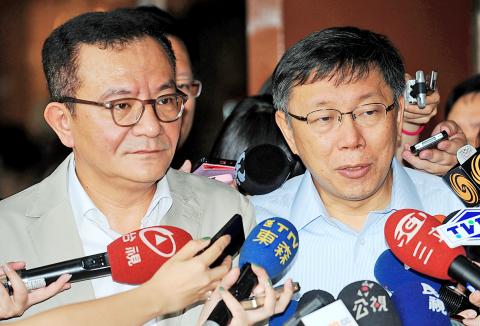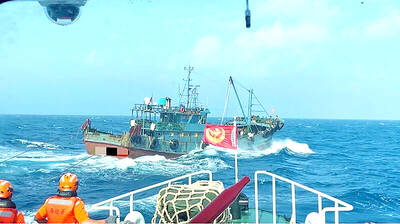The Democratic Progressive Party (DPP) yesterday made an unofficial commitment to independent Taipei mayoral hopeful Ko Wen-je (柯文哲) that it would not nominate its own candidate in the election and reached an agreement with the Taiwan Solidarity Union (TSU) that only one candidate would represent the pan-green camp in the New Taipei City mayoral election.
DPP Legislator Gao Jyh-peng (高志鵬), who served as convener of a task force for the DPP’s Taipei mayoral primary, issued a joint statement after a two-hour meeting with Ko that the DPP agreed to cooperate with the independent candidate to end the decade-long governance of the Chinese Nationalist Party (KMT) in Taipei.
The DPP pledged that it would not ask Ko to join the party should he win the election and that the party would not interfere with Ko’s personnel decisions, Gao said, adding that the 27 DPP candidates in the Taipei councilor elections would support Ko’s campaign.

Photo: Chang Chia-ming, Taipei Times
The meeting, which gathered the National Taiwan University Hospital physician and several DPP officials, including Gao and deputy secretary-general Hung Yao-fu (洪耀福), was held after Ko beat DPP Legislator Pasuya Yao (姚文智) in an opinion poll conducted by the DPP on Friday that aimed to finalize the sole pan-green camp candidate and boost the chances of defeating KMT nominee Sean Lien (連勝文).
The DPP’s decision not to nominate its own candidate in the Taipei mayoral election will not be official until the Central Executive Committee meets tomorrow, but the joint statement has erased any possibility that the party would renege on its promise to work with Ko, which at one point was creating confusion after the announcement of the poll result on Friday.
As part of the reciprocal commitment, Ko agreed to hold talks with DPP candidates in other mayoral and commissioner elections to formulate “shared platforms” and, if he wins the election, take the same positions as DPP mayors and commissioners on major policy discussions.
Ko also pledged to campaign for DPP candidates in the Taipei councilor elections.
Meanwhile, the DPP, led by former party secretary-general Su Jia-chyuan (蘇嘉全), convener of a special committee in charge of seven-in-one elections affairs, held talks with the TSU yesterday and both sides agreed to hold a public opinion survey by the end of this month to determine the final pan-green camp New Taipei City mayoral candidate in a similar format to the Taipei mayoral primary.
Former premier Yu Shyi-kun (游錫堃), the DPP’s candidate for the New Taipei City mayoral election, will compete with TSU Secretary-General Lin Chih-chia (林志嘉) in the primary poll.
The pan-green camp candidate’s rival in New Taipei City remains unclear as New Taipei City Mayor Eric Chu (朱立倫) has yet to announce whether he will seek re-election.
If Chu decides to run for the presidency in 2016, the most likely replacement candidate would be New Taipei City Deputy Mayor Hou You-yi (侯友宜).

MILITARY BOOST: The procurement was planned after Washington recommended that Taiwan increase its stock of air defense missiles, a defense official said yesterday Taiwan is planning to order an additional four PAC-3 MSE systems and up to 500 missiles in response to an increasing number of missile sites on China’s east coast, a defense official said yesterday. The official, who spoke on condition of anonymity, said that the proposed order would be placed using the defense procurement special budget, adding that about NT$1 trillion (US$32,88 billion) has been allocated for the budget. The proposed acquisition would include launchers, missiles, and a lower tier air and missile defense radar system, they said The procurement was planned after the US military recommended that Taiwan increase

POLITICAL AGENDA: Beijing’s cross-strait Mid-Autumn Festival events are part of a ‘cultural united front’ aimed at promoting unification with Taiwan, academics said Local authorities in China have been inviting Taiwanese to participate in cross-strait Mid-Autumn Festival celebrations centered around ideals of “family and nation,” a move Taiwanese academics said politicizes the holiday to promote the idea of “one family” across the Taiwan Strait. Sources said that China’s Fujian Provincial Government is organizing about 20 cross-strait-themed events in cities including Quanzhou, Nanping, Sanming and Zhangzhou. In Zhangzhou, a festival scheduled for Wednesday is to showcase Minnan-language songs and budaixi (布袋戲) glove puppetry to highlight cultural similarities between Taiwan and the region. Elsewhere, Jiangsu Province is hosting more than 10 similar celebrations in Taizhou, Changzhou, Suzhou,

COGNITIVE WARFARE: Chinese fishing boats transmitting fake identification signals are meant to test Taiwan’s responses to different kinds of perceived incursions, a report said Chinese vessels are transmitting fake signals in Taiwan’s waters as a form of cognitive warfare, testing Taipei’s responses to various types of incursions, a report by the Institute for the Study of War said on Friday. Several Chinese fishing vessels transmitted fake automatic identification system (AIS) signals in Taiwan’s waters last month, with one mimicking a Russian warship and another impersonating a Chinese law enforcement vessel, the report said. Citing data from Starboard Maritime Intelligence, the report said that throughout August and last month, the Chinese fishing boat Minshiyu 06718 (閩獅漁06718) sailed through the Taiwan Strait while intermittently transmitting its own AIS

CHINESE INFILTRATION: Medical logistics is a lifeline during wartime and the reported CCP links of a major logistics company present a national security threat, an expert said The government would bolster its security check system to prevent China from infiltrating the nation’s medical cold chain, a national security official said yesterday. The official, who wished to stay anonymous, made the remarks after the Chinese-language magazine Mirror Media (鏡周刊) reported that Pharma Logistics (嘉里醫藥物流) is in charge of the medical logistics of about half of the nation’s major hospitals, including National Taiwan University Hospital and Taipei Veterans General Hospital. The company’s parent, Kerry TJ Logistics Co (嘉里大榮物流), is associated with the National Committee of the Chinese People’s Political Consultative Conference (CPPCC) and the Chinese People’s Liberation Army (PLA), the